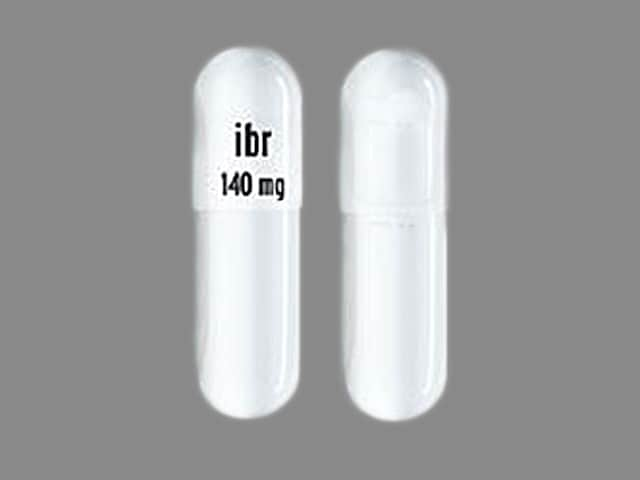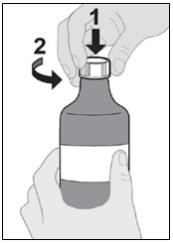Imbruvica
Generic name: ibrutinib
Drug class: BTK inhibitors
Medically reviewed by A Ras MD.
What is Imbruvica?
Imbruvica is a prescription medicine used to treat adults with Mantle cell lymphoma (MCL) who have received at least one prior treatment, Chronic lymphocytic leukemia (CLL)/Small lymphocytic lymphoma (SLL), Chronic lymphocytic leukemia (CLL)/Small lymphocytic lymphoma (SLL) with 17p deletion, Waldenström’s macroglobulinemia (WM), Marginal zone lymphoma (MZL) who require a medicine by mouth or injection (systemic therapy) and have received a certain type of prior treatment, Chronic graft versus host disease (cGVHD) after failure of 1 or more lines of systemic therapy
It is not known if Imbruvica is safe and effective in children.
Description
Ibrutinib is kinase inhibitor. It is a white to off-white solid with the empirical formula C25H24N6O2 and a molecular weight 440.50. Ibrutinib is freely soluble in dimethyl sulfoxide, soluble in methanol and practically insoluble in water. The chemical name for ibrutinib is 1-[(3R)-3-[4-amino-3-(4-phenoxyphenyl)-1H-pyrazolo[3,4-d]pyrimidin-1-yl]-1-piperidinyl]-2-propen-1-one and has the following structure:
![The following structure for Ibrutinib is kinase inhibitor. It is a white to off-white solid with the empirical formula C25H24N6O2 and a molecular weight 440.50. Ibrutinib is freely soluble in dimethyl sulfoxide, soluble in methanol and practically insoluble in water. The chemical name for ibrutinib is 1-[(3R)-3-[4-amino-3-(4-phenoxyphenyl)-1H-pyrazolo[3,4 d]pyrimidin-1-yl]-1-piperidinyl]-2-propen-1-one and has](https://dailymed.nlm.nih.gov/dailymed/image.cfm?name=imbruvica-01.jpg&setid=0dfd0279-ff17-4ea9-89be-9803c71bab44)
IMBRUVICA (ibrutinib) is available as immediate-release oral capsules and immediate-release oral tablets.
IMBRUVICA (ibrutinib) capsules for oral use are available in the following dosage strengths: 70 mg and 140 mg. Each capsule contains ibrutinib (active ingredient) and the following inactive ingredients: croscarmellose sodium, magnesium stearate, microcrystalline cellulose, sodium lauryl sulfate. The capsule shell contains gelatin, titanium dioxide, yellow iron oxide (70 mg capsule only), and black ink.
IMBRUVICA (ibrutinib) tablets for oral use are available in the following dosage strengths: 140 mg, 280 mg, 420 mg, and 560 mg. Each tablet contains ibrutinib (active ingredient) and the following inactive ingredients: colloidal silicon dioxide, croscarmellose sodium, lactose monohydrate, magnesium stearate, microcrystalline cellulose, povidone, and sodium lauryl sulfate. The film coating for each tablet contains ferrosoferric oxide (140 mg, 280 mg, and 420 mg tablets), polyvinyl alcohol, polyethylene glycol, red iron oxide (280 mg and 560 mg tablets), talc, titanium dioxide, and yellow iron oxide (140 mg, 420 mg, and 560 mg tablets).
Mechanism of Action
Ibrutinib is a small-molecule inhibitor of Bruton’s tyrosine kinase (BTK). Ibrutinib forms a covalent bond with a cysteine residue in the BTK active site, leading to inhibition of BTK enzymatic activity. BTK is a signaling molecule of the B-cell antigen receptor (BCR) and cytokine receptor pathways. BTK’s role in signaling through the B-cell surface receptors results in activation of pathways necessary for B-cell trafficking, chemotaxis, and adhesion. Nonclinical studies show that ibrutinib inhibits malignant B-cell proliferation and survival in vivo as well as cell migration and substrate adhesion in vitro.
What should I tell my healthcare provider before taking Imbruvica?
Before taking Imbruvica, tell your healthcare provider about all of your medical conditions, including if you:
- have had recent surgery or plan to have surgery. Your healthcare provider may stop Imbruvica for any planned medical, surgical, or dental procedure.
- have bleeding problems
- have or had heart rhythm problems, smoke, or have a medical condition that increases your risk of heart disease, such as high blood pressure, high cholesterol, or diabetes
- have an infection
- have liver problems
- are pregnant or plan to become pregnant. Imbruvica can harm your unborn baby. If you are able to become pregnant, your healthcare provider will do a pregnancy test before starting treatment with Imbruvica.
- Females should not become pregnant during treatment and for 1 month after the last dose of Imbruvica.
- Males should avoid getting female partners pregnant during treatment and for 1 month after the last dose of Imbruvica.
- are breastfeeding or plan to breastfeed. You and your healthcare provider should decide if you will take Imbruvica or breastfeed.
Tell your healthcare provider about all the medicines you take, including prescription and over-the-counter medicines, vitamins, and herbal supplements. Taking Imbruvica with certain other medicines may affect how Imbruvica works and can cause side effects.
How should I take Imbruvica?
- Take Imbruvica exactly as your healthcare provider tells you to take it.
- Take Imbruvica 1 time a day.
- Swallow Imbruvica capsules and tablets whole with a glass of water.
- Do not open, break, or chew Imbruvica capsules.
- Do not cut, crush, or chew Imbruvica tablets.
- Take Imbruvica at about the same time each day.
- If you miss a dose of Imbruvica take it as soon as you remember on the same day. Take your next dose of Imbruvica at your regular time on the next day. Do not take extra doses of Imbruvica to make up for a missed dose.
- If you take too much Imbruvica call your healthcare provider or go to the nearest hospital emergency room right away.
What should I avoid while taking Imbruvica?
You should not drink grapefruit juice, eat grapefruit, or eat Seville oranges (often used in marmalades) during treatment with Imbruvica. These products may increase the amount of Imbruvica in your blood.
What are the possible side effects of Imbruvica?
Imbruvica may cause serious side effects, including:
- Bleeding problems (hemorrhage) are common during treatment with Imbruvica, and can also be serious and may lead to death. Your risk of bleeding may increase if you are also taking a blood thinner medicine. Tell your healthcare provider if you have any signs of bleeding, including:
- blood in your stools or black stools (looks like tar)
- pink or brown urine
- unexpected bleeding, or bleeding that is severe or
that you cannot control - vomit blood or vomit looks like coffee grounds
- cough up blood or blood clots
- increased bruising
- dizziness
- weakness
- confusion
- change in your speech
- headache that lasts a long time
- Infections can happen during treatment with Imbruvica. These infections can be serious and may lead to death. Tell your healthcare provider right away if you have fever, chills, weakness, confusion, or other signs or symptoms of an infection during treatment with Imbruvica.
- Decrease in blood cell counts. Decreased blood counts (white blood cells, platelets, and red blood cells) are common with Imbruvica, but can also be severe. Your healthcare provider should do monthly blood tests to check your blood counts.
- Heart rhythm problems (ventricular arrhythmias, atrial fibrillation and atrial flutter). Serious heart rhythm problems and death have happened in people treated with Imbruvica, especially in people who have an increased risk for heart disease, have an infection, or who have had heart rhythm problems in the past. Tell your healthcare provider if you get any symptoms of heart rhythm problems, such as feeling as if your heart is beating fast and irregular, lightheadedness, dizziness, shortness of breath, chest discomfort, or you faint. If you develop any of these symptoms, your healthcare provider may do a test to check your heart (ECG) and may change your Imbruvica dose.
- High blood pressure (hypertension). New or worsening high blood pressure has happened in people treated with Imbruvica. Your healthcare provider may start you on blood pressure medicine or change current medicines to treat your blood pressure.
- Second primary cancers. New cancers have happened during treatment with Imbruvica, including cancers of the skin or other organs.
- Tumor lysis syndrome (TLS). TLS is caused by the fast breakdown of cancer cells. TLS can cause kidney failure and the need for dialysis treatment, abnormal heart rhythm, seizure, and sometimes death. Your healthcare provider may do blood tests to check you for TLS.
The most common side effects of Imbruvica in adults with B-cell malignancies (MCL, CLL/SLL, WM and MZL) include:
The most common side effects of Imbruvica in adults with cGVHD include:
- tiredness
- bruising
- diarrhea
- mouth sores (stomatitis)
- muscle spasms
- nausea
- pneumonia
Diarrhea is a common side effect in people who take Imbruvica. Drink plenty of fluids during treatment with Imbruvica to help reduce your risk of losing too much fluid (dehydration) due to diarrhea. Tell your healthcare provider if you have diarrhea that does not go away.
These are not all the possible side effects of Imbruvica.
Call your doctor for medical advice about side effects. You may report side effects to FDA at 1-800-FDA-1088.
General information about the safe and effective use of Imbruvica
Medicines are sometimes prescribed for purposes other than those listed in a Patient Information leaflet. Do not use Imbruvica for a condition for which it was not prescribed. Do not give Imbruvica to other people, even if they have the same symptoms that you have. It may harm them. You can ask your pharmacist or healthcare provider for information about Imbruvica that is written for health professionals.
How should I store Imbruvica?
- Store Imbruvica capsules and tablets at room temperature between 68°F to 77°F (20°C to 25°C).
- Keep Imbruvica capsules in the original container with the lid tightly closed.
- Keep Imbruvica tablets in the original carton.
Keep Imbruvica and all medicines out of the reach of children.
What are the ingredients in Imbruvica?
Active ingredient: ibrutinib
Inactive ingredients:
Capsules: croscarmellose sodium, magnesium stearate, microcrystalline cellulose, and sodium lauryl sulfate. The 70 mg capsule shell contains gelatin, titanium dioxide, yellow iron oxide, and black ink. The 140 mg capsule shell contains gelatin, titanium dioxide, and black ink.
Tablets: colloidal silicon dioxide, croscarmellose sodium, lactose monohydrate, magnesium stearate, microcrystalline cellulose, povidone, and sodium lauryl sulfate. The film coating for each tablet contains ferrosoferric oxide (140 mg, 280 mg, and 420 mg tablets), polyvinyl alcohol, polyethylene glycol, red iron oxide (280 mg and 560 mg tablets), talc, titanium dioxide, and yellow iron oxide (140 mg, 420 mg, and 560 mg tablets).
Label
PRINCIPAL DISPLAY PANEL – 28 Tablet Blister Carton
- NDC 57962-014-28
- Imbruvica®
(ibrutinib) tablets - 140 mg
- Each tablet contains: ibrutinib 140 mg
Wallet card contains 28 tablets - Rx Only
- Pharmacyclics®
An AbbVie Company - Janssen


PRINCIPAL DISPLAY PANEL – 28 Tablet Blister Carton
- NDC 57962-280-28
- Imbruvica®
(ibrutinib) tablets - 280 mg
- Each tablet contains: ibrutinib 280 mg
Wallet card contains 28 tablets - Rx Only
- Pharmacyclics®
An AbbVie Company - Janssen

![]()
PRINCIPAL DISPLAY PANEL – 28 Tablet Blister Carton
- NDC 57962-420-28
- Imbruvica®
(ibrutinib) tablets - 420 mg
- Each tablet contains: ibrutinib 420 mg
Wallet card contains 28 tablets - Rx Only
- Pharmacyclics®
An AbbVie Company - Janssen

![]()
PRINCIPAL DISPLAY PANEL – 28 Tablet Blister Carton
- NDC 57962-560-28
- Imbruvica®
(ibrutinib) tablets - 560 mg
- Each tablet contains: ibrutinib 560 mg
Wallet card contains 28 tablets - Rx Only
- Pharmacyclics®
An AbbVie Company - Janssen

![]()
SRC: NLM .
